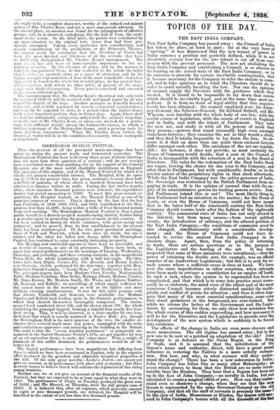BIRMINGHAM MUSICAL FESTIVAL.
This—the greatest of all the provincial music-meetings—has been going on during the present week, and terminated yesterday. The Birmingham Festival has been held every three years, without interrup- tion, for more than three quarters of a century ; and its net receipts have contributed more than anything else to the eupport of the General Hospital, one of the most useful charitable institutions in England. The statistics of this charity, and of the Musical Festival by which it is chiefly fed, possess considerable interest. The Hospital, from its open- ing in 1779 to the present time, has given assistance to more than half- a-million of patients, of whom above a hundred thousand, have been admitted as inmates within its walls. During the last twelve months alone, above nineteen thousand persons were relieved; the expenditure during that period amounting to 7600/. To meet this great annual ex- penditure, the Hospital depends on the Musical Festival as one of its principal sources of revenue. This is shown by the fact that the last -four Festivals, of 1846, 1849, 1852, and 1855, contributed to the Hos- pital no less than 15,5001., being within a trifle of Four thousand pounds from each meeting. The Birmingham Musical Festival is thus a great public benefit to a densely-peopled manufacturing district, besides being a powerful agent in promoting the progress of music in this country. It has been carried on during its whole existence, with great energy and judgment ; and its growth, from its first establishment to the present time, has been uninterrupted. Of the two great provincial meetings, those of York and Norwich, which were once its rivals, the one is extinct, and the other has fallen into decay, while the Birmingham Festival has continued to enjoy constantly increasing prosperity.
The Meeting now concluded appears to have been as successful, and as worthy of success, as any of its precursors. There have been, as usual four sacred performances on the mornings of Tuesday, Wednesday, Thursday, and yesterday, and three evening concerts, in the magnificent Town Hall; the whole terminating with a ball last night. The Ora- torios have been Elijah, Costa's Eli, The Messiah, and Henry Leslie's new Oratorio, Judith, performed for the first time; together with Men- delssohn's Sacred Cantata, "Lands Sion," and Beethoven's Mass in C. The principal singers have been Madame Clara Novella, Mademoiselle Balfe, Madame Castellan, Miss Dolby, Madame Alboni, Madame Viardot, Mr. Sims Reeves, Mr. Montem Smith, Mr. Weiss, and Signors Tamber- hk, Roncom, and Belletti; an assemblage of talent amply sufficient for the sacred music in the mornings as well as the lighter and more brilliant evening entertainments. It was for this latter purpose only that Alboni, Tamberlik, and Ronconi, were available : but Madame Viardot and Bclletti took leading parts in the Oratorio performances, to which they showed themselves thoroughly competent. The instru- mental band numbered about 150, and the chorus about 330; the whole (including the principal singers) forming a tuneful host nearly five hun- dred strong. This, it will be observed, is a force smaller by two hun- dred than that which is usually mustered in Exeter Hall : yet, though the Birmingham Hall is the more spacious of the two the smaller or- chestra there evinced much more real power, unminded with the noise and confusion so oppressive and annoying in the building in the Strand. The truth is that the "seven hundred performers" so pompously an- nounced in the Sacred Harmonic Society's bins, are got together by way of an ad captandum device to make the rulgus stare. Were a couple of hundreds of this rabble dismissed, the performances would be all the better for it.
The Sacred performances have been magnificent, but differing from those to which we have been accustomed in London, only in the superior effect produced by the grandeur and admirable acoustical properties of the hall. Of the only great novelty—Leslie's Judith---we cannot yet Five an account, as its performance took place only yesterday; but there as every reason to believe that it will enhance the reputation of this rising young musician. Neither can we as yet give an account of the financial results of the Festival, but they are expected to be at least equal to what they were in 1855. The performance of Elijah, on Tuesday, produced the great sum of 24851.; and The Messiah, on Thursday, drew the still greater sum of 27901. It is believed that, after all expenses, which generally amount to eight or nine thousand pounds, are defrayed, the Hospital wilfbe benefited to the extent of not less than five thousand pounds.


































 Previous page
Previous page